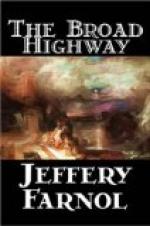That day I passed through several villages, stopping only to eat and drink; thus evening was falling as, having left fair Sevenoaks behind, I came to the brow of a certain hill, a long and very steep descent which (I think) is called the River Hill. And here, rising stark against the evening sky, was a gibbet, and standing beneath it a man, a short, square man in a somewhat shabby coat of a bottle-green, and with a wide-brimmed beaver hat sloped down over his eyes, who stood with his feet well apart, sucking the knob of a stick he carried, while he stared up at that which dangled by a stout chain from the cross-beam of the gibbet,—something black and shrivelled and horrible that had once been human.
As I came up, the man drew the stick from his mouth and touched the brim of his hat with it in salutation.
“An object lesson, sir,” said he, and nodded towards the loathsome mass above.
“A very hideous one!” said I, pausing, “and I think a very useless one.”
“He was as fine a fellow as ever thrust toe into stirrup,” the man went on, pointing upwards with his stick, “though you’d never think so to look at him now!”
“It’s a horrible sight!” said I.
“It is,” nodded the man, “it’s a sight to turn a man’s stomach, that it is!”
“You knew him perhaps?” said I.
“Knew him,” repeated the man, staring at me over his shoulder, “knew him—ah—that is, I knew of him.”
“A highwayman?”
“Nick Scrope his name was,” answered the man with a nod, “hung at Maidstone assizes last year, and a very good end he made of it too; and here he be—hung up in chains all nat’ral and reg’lar, as a warning to all and sundry.”
“The more shame to England,” said I; “to my thinking it is a scandal that our highways should be rendered odious by such horrors, and as wicked as it is useless.”
“’Od rot me!” cried the fellow, slapping a cloud of dust from his coat with his stick, “hark to that now.”
“What?” said I, “do you think for one moment that such a sight, horrible though it is, could possibly deter a man from robbery or murder whose mind is already made up to it by reason of circumstances or starvation?”
“Well, but it’s an old custom, as old as this here road.”
“True,” said I, “and that of itself but proves my argument, for men have been hanged and gibbeted all these years, yet robbery and murder abide with us still, and are of daily occurrence.”
“Why, as to that, sir,” said the man, falling into step beside me as I walked on down the hill, “I won’t say yes and I won’t say no, but what I do say is—as many a man might think twice afore running the chance of coming to that—look!” And he stopped to turn, and point back at the gibbet with his stick. “Nick can’t last much longer, though I’ve know’d ’em hang a good time—but they made a botch of Nick—not enough tar; you can see where the sun catches him there!”




